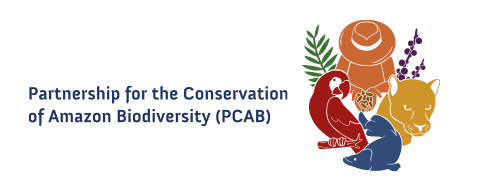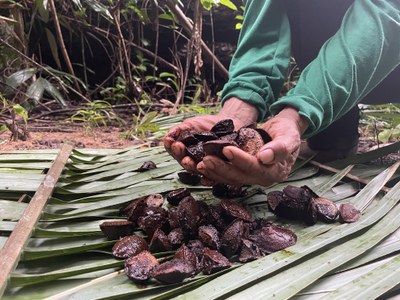Our Forest Our Home Strengthens Indigenous Initiatives
November / December 2023 – Closing yet another year, the Nossa Floresta Nossa Casa project (Our Forest, Our Home) boasts many lessons learned and positive results that contributed to strengthening eight Indigenous lands in the Amazon.
With a focus on Indigenous economic initiatives and governance, Nossa Floresta Nossa Casa structures the value chains of Brazil nuts, cocoa, açaí, handicrafts, and tourism. Additionally, they deliver training in territorial economic governance to establish ideal conditions for market access in a fair and ethical way. The Tupi Mosaic covers eight Indigenous lands in the states of Rondônia and Mato Grosso, which are home to over 21 Indigenous Peoples.
The Forest Trends Communities and Territorial Governance Initiative (ICGT-FT) and Greendata—Socioeconomic and Environmental Management and Innovation Center act as management implementers, under a strategic partnership with USAID/Brazil and the Partnership Platform for the Amazon (PPA).
Last year, several training programs were delivered to the communities, including workshops on pricing, planning, management, preparation of proposals for leveraging resources, good handling practices, and harvest planning.
The Brazil nut value chain is considered the most relevant for the Amazon due to its potential to generate income, its ecological role, and its cultural value for Indigenous peoples and traditional communities in the forest. This value chain benefited 461 gatherers (directly and indirectly), and engaged 215 people in direct actions. Nine groups of nut gatherers received technical assistance and rural extension training. In addition, storage sheds were built at the Sete de Setembro and Zoró Indigenous Lands.
Amauri Zoró, a representative of the Zoró Indigenous Association (APIZ) and the Cooperative of the Zoró people (COOPERAPIZ), stresses the importance of partnerships in the complex Brazil nut production and marketing field. “Through partnerships, the most positive result is that people are benefiting and selling their products. This enables them to purchase machetes, sacks, and fuel, which makes harvesting easier. This partnership is important so that we can get stronger."
The cocoa chain has significant economic initiatives for socioproductive inclusion, not only generating income but contributing to forest conservation through agroforestry systems. It benefited 203 Indigenous people and included training and programs on cocoa processing and other sustainable practices aimed at fermenting high-quality kernels, thus opening doors to different markets.
Marcio Suruí, a cocoa producer from the Mauíra Village at the Sete de Setembro Indigenous Land, explains the community currently understands the importance of working with cocoa. "We started working 10 years ago. We realized it could be a source of income, and learned how to produce high-quality cocoa. Every day, we try to improve the quality of our work and our cocoa beans, increasing the market value of our product. Partnerships such as Forest Trends are very important, as they always encourage and motivate Indigenous producers."
Crafts play an essential role for the autonomy of Indigenous women artisans, including young people, and contribute to strengthening their ancestral knowledge. This chain benefited 455 people, 376 of whom were women. They attended workshops on different topics, including solidarity economy, planning, management, and market strategies. They received 119 tool kits.
According to Thariana Cinta Larga, a young Indigenous representative of Wanzeej Pakup Pit art collective, “We must hold these workshops so that we never forget our past. Artisanal work goes much further, it brings us peace and tranquility, knowing that our ancestors will never be forgotten. We will be passing on what we learned to younger generations."
Açaí and tourism are the other two chains developed under the project. Açaí supported 70 beneficiaries just as tourism focused workshops and proposals to leverage funds were processed. “With this project, we managed to save money. I built my house with the money I made from açaí. I managed to buy a car, and other people bought motorcycles to go to work,” says Everson Aikanã Kwazá, from the Kwazá Indigenous Land of Rio São Pedro, who works in the açaí chain.
Governance – The project focuses on facilitating ethical and fair markets through training delivered to Indigenous people, and strengthening economic and territorial governance.
The governance training program supported 40 participants – half of whom were women. All participants graduated and received a certificate. During the past year, four biocommunity protocol workshops were held on three Indigenous lands for 75 participants.
The governance awareness workshops attracted 213 participants.
For more information, visit the PPA site.



